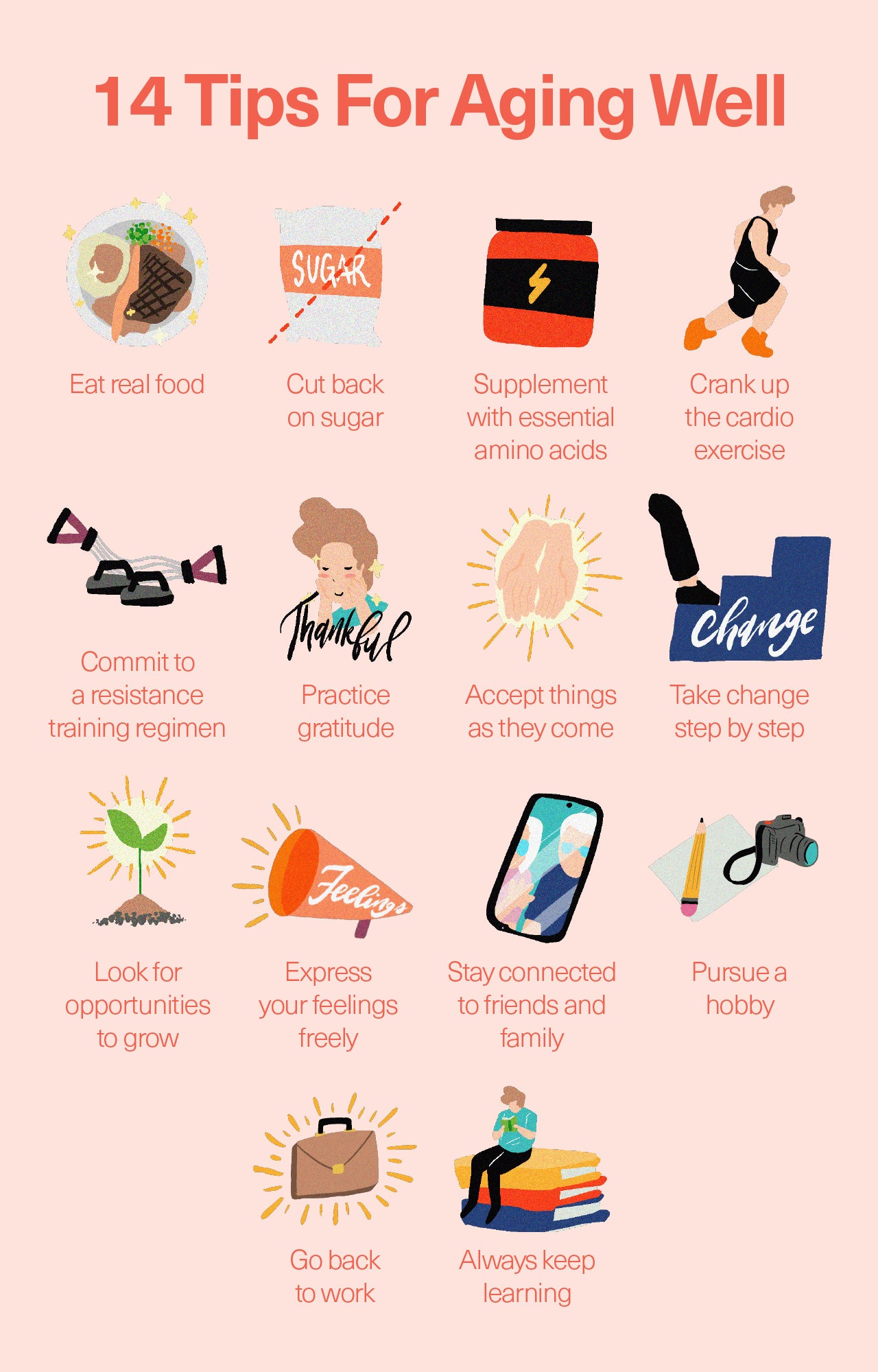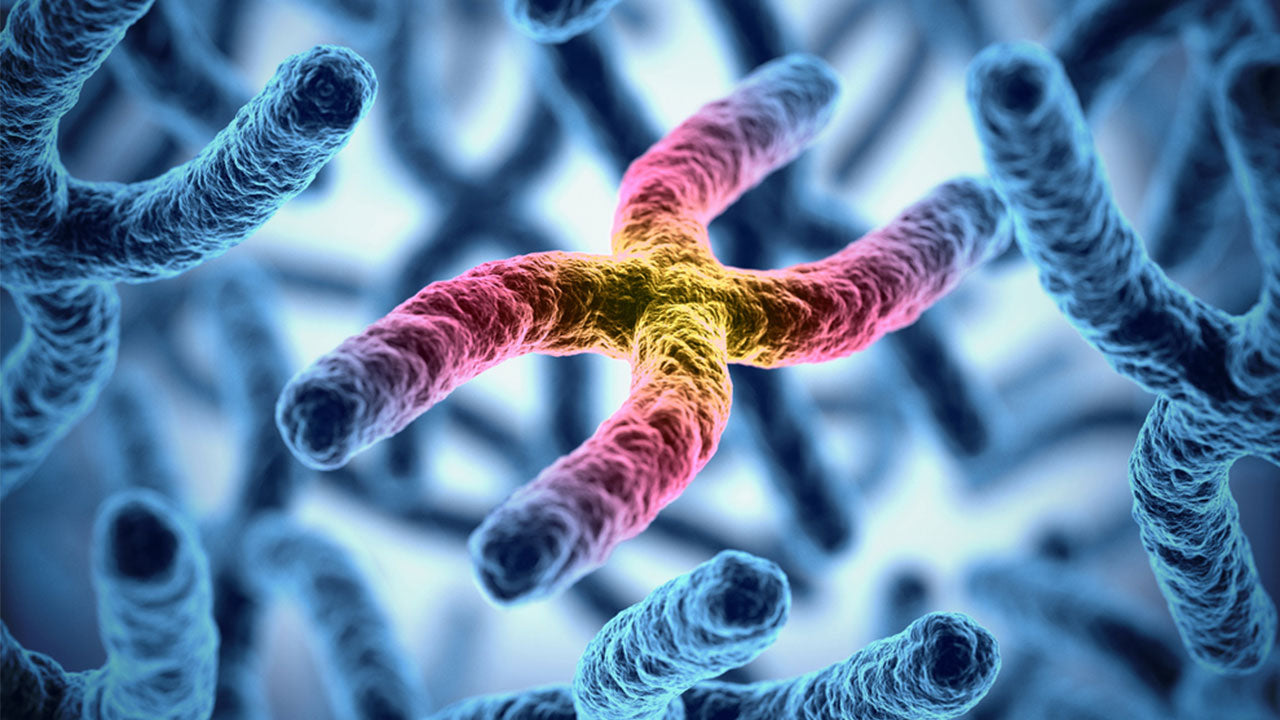Aging Well: How to Live Long and Strong Into Your Golden Years
 By: by Amino Science
By: by Amino Science

In 1938, at the tail end of the Great Depression, Harvard researchers embarked upon the most thorough and long-running investigation of aging ever. They followed more than 800 women and men from adolescence to old age to determine what makes us happiest and more likely to live longer. What they found was shocking. Aging well isn’t just about keeping your blood pressure and cholesterol levels in the normal range. Longevity depends upon far more nuanced dietary and lifestyle choices. The great news is that these choices are entirely in your control, which means healthy aging is up to you!
6 Keys to Happiness and Longevity
The Harvard Study of Adult Development narrowed happiness and longevity down to 6 determinants:
- Avoid cigarettes
- Develop strong coping skills
- Maintain a healthy weight
- Exercise regularly
- Enjoy supportive interpersonal relationships
- Pursue education
We’ve got feel-good tips below to help you succeed with each of these aging well recommendations. But first, let’s blast apart some aging myths that may be causing you unnecessary stress and fear as you transition from one life phase to another.

Body-Mind Aging Myths
#1 Aging Will Eventually Bring on a Disability or Disease
Disease and disability are not inevitable. More often than not, they are the result of misuse and neglect—not eating a proper diet, suffering from nutrient deficiencies, not being physically active enough, not managing stress, and not making the necessary changes when health markers signal an adjustment is in order. There are steps you can take to greatly increase your odds of living a disease-free and high-quality life well into your golden years.
#2 Aging Will Eventually Rob Me of My Memory
The brain may slow down while it ages and take a bit longer to retrieve memories, but memory loss, such as that associated with Alzheimer’s disease and dementia, is not an aging given. In fact, research shows that the brain is capable of creating new neurons and neural networks at any age. You just need to feed it the right foods and give it the stimulation it needs. That means participating in new activities, taking on new challenges, and learning new things whether you’re 8 or 80!

Aging Well for the Body
We won’t spend much time on the first key to happiness and longevity—avoiding cigarettes—as the danger of cigarettes has been enumerated time and again, and if aging well is your desire, well, you already know that you’ve got to quit smoking.
Maintaining a healthy weight and exercising regularly aren’t groundbreaking recommendations either, but they can be hard habits to make when you’re older and already settled into a sedentary lifestyle and carrying surplus weight.
We’ve got some tips on how older adults can easily create new healthy habits. As you begin making these changes, keep in mind that it takes on average 66 days to form a new habit. That means in just 3 short months dietary and lifestyle changes that once seemed impossible will feel comfortable and familiar. You may even find you enjoy them, and we guarantee you will be feeling better and aging well!
Weight Loss and Maintenance
If you’re looking to lose weight, there are many diet protocols to try, from the keto diet to the DASH diet and everything in between. Your specific goals, medical restrictions, and dietary preferences will dictate the weight-loss program you follow, but there are some universal tips for achieving and maintaining a healthy weight that everyone interested in aging well should follow.
Eat Real Food
That breakfast bar you put down with your coffee? Not real food. Neither is the frozen burrito you just heated up in the microwave. Or the chips waiting for you in your office. Or the bag of premade veggie risotto you plan to plop in a pan and heat up tonight for dinner. Not real food. Not really.
These prepackaged foods contain additives, preservatives, and other health-compromising ingredients. A 2019 study in the journal Nutrients reported that approximately 80% of an American’s diet comes from packaged foods and beverages. The study confirmed that these highly processed foods are laden with sugar, sodium, and unnecessary calories—a recipe for obesity and chronic disease, including heart disease, type 2 diabetes, and liver disease!
Time to clear out the pantry, fridge, and freezer of all items packaged, canned, and boxed and fill up your shelves with fresh foods:
- Fruits
- Vegetables
- Lean meats
- Cold-water fish
- Whole grains (not instant. The kind that you cook!)
Cut Back on Sugar
When you fill up on sugars they turn into carbohydrates in the body. And all the excess that isn’t immediately burned for energy ends up becoming stored as fat in your fat cells, causing weight gain. In other words, that fat-free sugary soda you love turns into fat on your frame!
Sugar also shows up visibly on the skin. A high-sugar diet can harm collagen and elastin tissue and encourage sagging and wrinkles.
When we suggest cutting back on sugar, we’re not suggesting neglecting your sweet tooth. Natural sugars from real food like honey, fruits, and dark chocolate can be enjoyed in moderation as part of a healthy eating plan. But sugars in the form of beverages and packaged foods should be avoided. In fact, if you stopped eating these ultra-processed foods you’d likely cut out 90% of your sugar intake according to a study published in the journal Nutrition and Metabolism.
Supplement with Amino Acids
Boosting metabolism and losing weight go hand in hand, and there’s no better way to speed up your metabolism and your fat-burning capacity than to increase your muscle mass. The more muscle you have the more calories you burn.
A 10-kilogram difference in muscle mass, with all else staying constant, is around a 35,000-kilocalorie difference in energy expenditure over a year. There’s about 3,500 kilocalories in 1 pound of body fat, which means that over an entire year you’re losing 10 pounds of body fat… just by increasing your muscle mass!
To do that, you’ll need to start eating a heck of a lot more protein. And since most older people don’t get enough protein—you can check out this study from the Journal of Nutrition, Health, and Aging for the stats—taking a supplement made up of the building blocks of protein does more than just help build up your muscles in later life. It optimizes your overall health by boosting immunity and protecting the health of your heart, liver, kidneys, and other organs.
Amino Co’s Active Aging blend is clinically proven to stimulate muscle growth and repair 3 times more effectively than any protein source. It supports healthy triglyceride and LDL levels, promotes healthy blood flow to help lower high blood pressure, and preserves heart strength and function while improving physical function, strength, and mobility. You can learn more about our Active Aging blend here.
It’s the perfect complement to an exercise program, which is next on the agenda!
Sticking to Regular Exercise
Aging well is dependent on movement, both the kind of movement that increases your heart rate and the kind that increases your muscle strength. But the specifics of that movement are entirely up to you.
Crank Up the Cardio
The U.S Department of Health and Human Services Physical Activity Guidelines set the cardio minimum at 150 minutes per week of moderate-intensity exercise. That can break down into any increments you’d like—30 minutes, 5 days a week, or 45 minutes 3 days a week, or 22 minutes, 7 days a week—but it applies to all adults, even the elderly and disabled.
Cardio doesn’t have to be a high-intensity exercise that elevates your heart rate to the point in which you’re gasping for breath and sweating bullets. Walking for 30 minutes after dinner each day is the type of low-level aerobic exercise that offers the cardio-protective and physical health benefits we need as we age. Perhaps you prefer cycling, or water aerobics? There are tons of options: hiking on the weekends and catching some vitamin-D-rich sun rays, joining a dance or Zumba class, or rowing 3 days a week, to name a few.
Commit to Resistance Training
Muscle mass decline is a natural part of the aging process, which causes fat mass to rise. But natural doesn't mean inevitable! Resistance training protects against age-related muscle loss, especially when you take essential amino acids daily to help increase muscle protein synthesis and spur muscle growth.
Resistance training is as varied as a cardio program. You can build lean muscle mass by working against a weight or force, be it dumbbells, a barbell, weight machines, resistance bands, or your own body weight. And there are likewise many different types of strength training. Yoga, barre classes, even tai chi are approachable forms of resistance training for all activity levels, beginner to advanced.
Aging Well for the Mind
According to Harvard researchers, coping, connection, and continued education are the keys to anti-aging and optimal well-being. But what does that look like for the aging population?
Coping with Change
Change comes on strong at any age, but it can be even more aggressive as we move from our middle years to our older. The passing of friends and loved ones, the transition from career to retirement, and diminishing health and independence give change an edge that can wear away at our resilience and positivity. Which is why developing strong coping skills is so important.
Coping with change requires flexibility and balance. Helpful coping strategies include:
- Practicing gratitude. Being grateful for the little things helps balance the challenge of change. Wake up in the morning and go to bed at night acknowledging five things you are grateful for. Start a gratitude vase. Every time something positive happens, write it down on a slip of paper and stick it in your vase. When times get tough, go to your vase for a reminder of all you have to be grateful for.
- Accepting what you cannot control. It is human nature to resist even the things we cannot change. Acceptance allows for solutions while resistance creates more obstacles. When you notice you are resisting, switch your stance to one of acceptance so you can move forward toward positive change.
- Tackling change in steps. Change all at once is too overwhelming, which is why it’s important to tackle it step by step. Whether you’re changing a longstanding behavior 1% at a time, or breaking an endeavor, such as managing a medical diagnosis into baby goals, change is easier to manage when it’s a one-thing-at-a-time process.
- Expressing your feelings. You know what happens when there’s too much pressure on a dam. It breaks! The same goes for your mental health when feelings are pent up rather than expressed. Of course, it’s important to have an appropriate outlet such as a trusted friend or a therapist to help you work through and express your feelings as they arise.
- Growing from it. Every challenge carries a lesson if you let it. Treating every experience in your life as an opportunity for growth, especially the most difficult ones, doesn’t just widen your perspective, it expands your life and strengthens your resilience so you're better prepared for the next tidal wave (ahem...opportunity).
Staying Connected
Staying socially active and maintaining social connections is just as important to aging well as eating your peas and carrots. It keeps your mind active, your heart happy, and your brain engaged.
One study of more than 1100 seniors without dementia showed that those who were more socially active over 12 years had 70% less cognitive decline than seniors who were not that socially active.
As we grow older, however, we lose many of these relationships to death, retirement, relocation, lack of transportation, etc., and it can be difficult to make new friends.
Nurture and grow your social network by…
- Saying hello often. Whether it’s face to face, over the phone, or by video chat, check in with your friends and family frequently. It can help to set a schedule. Perhaps it’s a Monday night Zoom call with your family members or a Sunday brunch with your close friends.
- Finding a hobby. Perhaps you join a club or volunteer at your local community center. Pursuing interests that you may not have had time for when you were younger is a great way to meet new people and build close personal relationships.
- Going back to work. Although the official retirement age is 65-67 depending on your birth year, more and more Americans are choosing to keep on working, whether it be in a full-time capacity or part-time, such as taking on consulting gigs. Many people also choose to finally pursue the career of their dreams upon retirement.
You have so many years of wisdom behind you. Retirement doesn’t mean sitting back in your recliner, watching Hallmark movies on repeat, and waiting for the onset of health problems. Not when there’s so much yet to enjoy and experience! Which brings us to…
Continuing to Learn
Learning new things, whether it’s a musical instrument, foreign language, crossword puzzle, or an advanced degree, fires up the brain synapses and creates new neural pathways, so that your brain grows stronger with age.
What are your “somedays”?
Someday I’ll learn Spanish.
Someday I’ll write a book.
Someday I’ll learn to play the cello.
Someday I’ll set up an art studio and start painting.
Someday I’ll go back to school and complete my degree.
Turn someday into today and you’ll be keeping your mind sharp and your brain healthy!
Aging Well with the Amino Co
Our mission is simple: To help people live happier and healthier lives. Which is why aging well is our top priority. It drives the development of all of our amino acid blends. You can find out more about our products and how they can help you age well on our product page.
And we encourage you to stay connected with us on social media, and share your tips for successful aging in the comments below. We’re in this grand adventure of life together, after all.

Up to 25% off Amino
Shop NowTAGS: anti-aging
Join the Community
Comments (0)
Most Craveable Recipes




 833-264-6620
833-264-6620



















